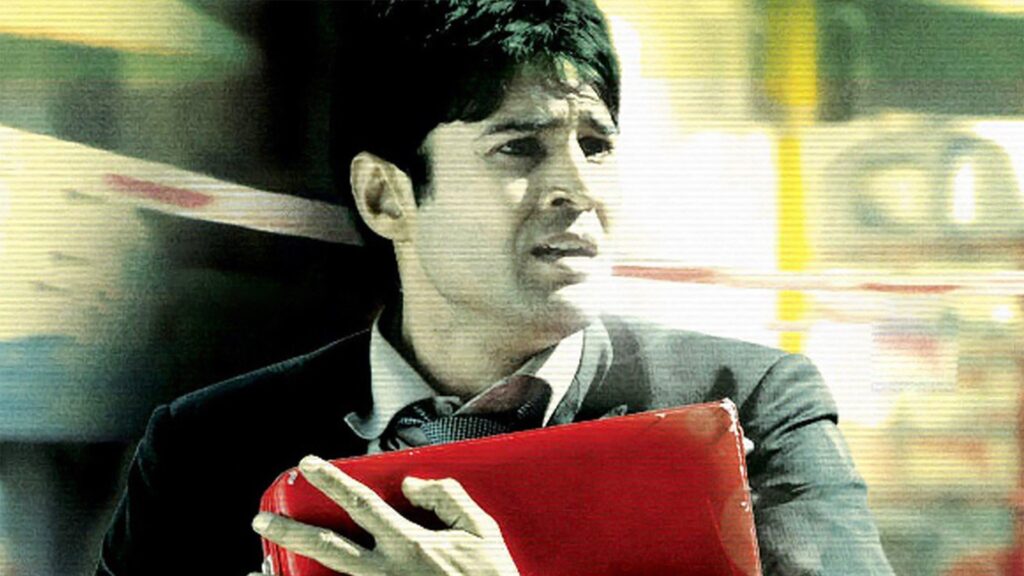Aamir starts off with the right notes. No titles, scene 1 – Aamir Ali lands at Mumbai’s international airport and straightaway the action/ thriller begins with a phone call – for the rest of the film, Aamir (the character) is lead unstoppably through the by-lanes, nallis, gullies, and yes, even sandas’s of the murky underbelly the city provides as a frenetic pace that rarely slows down. The critical plot device of keeping the audience in the exact same knowhow as the protagonist – nothing more, nothing less – works well as we are hooked to the story and empathize with the character as the film unfolds.
There are many reasons that make Aamir an excellent film, and some that take away from it being a perfect film. The main reason for the latter is that the plot is wafer-thin and well, the build-up and subsequent climax leaves a few questions unanswered. You’re also left wondering what could’ve been had Aamir made a few different decisions in the end (this kind of negates the tagline of the movie) and why would the evil guys insist on a) using him in the first place, and b) sparing him eventually.
Also, given that the director is Anurag Kashyap’s associate, and that Kashyap is the ‘creative producer’, and that a lot of the crew is same – the film is very reminiscent of Black Friday. In fact, a couple of scenes look exactly the same – the bit where the Aamir is chasing the goons who’ve stolen the briefcase through a slum looks rather similar of the cop chase in BF.
Anyway, the best part about the film is that it is brilliantly directed. After a long time a debutant director leaves a stamp of creativity that is unrivalled by any other single contributor. Every scene and shot is well thought out and equally well executed technically. The director’s footprints are clearly visible in the film – the fact that every scene has a phone in the form of a mobile, PCO, or regular phone is just very cool. So are the little nuances like Aamir unable to get into the bus from the front initially, yet forced to later – these little touches add greatly to the film. Raj Kumar Gupta isn’t indulgent in any way and focuses on what the film is about without showing-off by wasting any time trying to establish production value or using fancy camera angles. In fact the best scene is when Aamir is forced into a public loo to retrieve a scrap of paper. It is so real, so well-textured, you can smell the pestilences. When you can smell something in cinema, it’s good directing.
But other departments are not to be left behind! The camerawork is simply outstanding. Alphonse Roy is just plain brilliant. He comes with a decades of work of National Geographic documentary work to his credit – and we all know Nat Geo employs the best of the best when it comes to their imaging – still or moving. Every single frame is ideal: in focus, appropriately-lit and nicely framed. Talking about focus – it’s amazing to see what mediocrity is producing these days – there are ton loads of huge films that just can’t get a simple thing like focus right (you have to see Sarkar Raj to believe how badly it is shot!). Wasiq Khan continues where he left of with Black Friday and No Smoking – art directing Aamir with the aptitude of a man who knows the city as well as he shows it and makes it look easy. This guy is a class apart. Editing by Aarti Bajaj is good, especially in the first half – though the film does lose a little steam in the second, especially right after the break when you realize that Aamir is still getting calls, and he still has to play treasure hunt for a while. This only stops when he actually gets the big, red, bright briefcase. Which gets us to the music – the background score is really effective, not loud (try Sarkar Raj for comparison), and perfectly in sync with the mood of the film, conveying urgency, dread, and suspense effectively. The couple of songs are used very well as background pieces. Overall, a good job by Amit Trivedi.
The acting is good too. Rajeev Khandelwal makes the transition from television smoothly (it’s time to throw out the time-honored tradition of ignoring television actors, just because they chose ‘television’ first, out of the window) and does a fine job. Clearly the entire film hinges on him as it’s purely a one-man-show and he doesn’t disappoint.
Undoubtedly, featuring a first time director, cameraperson, and lead actor, Aamir is a cracker of a movie and reinstates the fact that fresh perspectives and low budgets don’t make any difference.
Hindi, Drama, Thriller, Color


